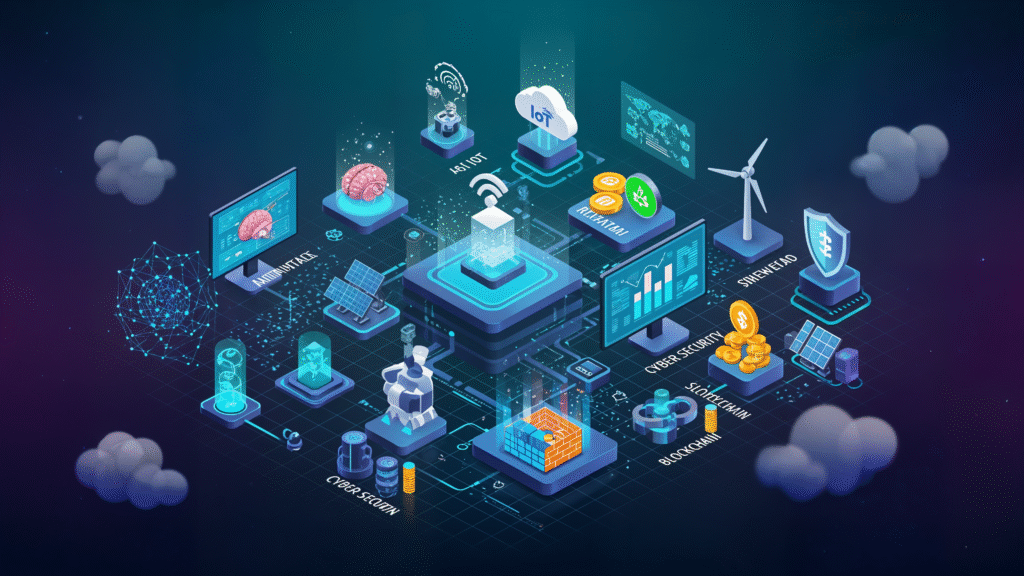🌍🔥 Introduction: Why Emerging Technologies Matter More Than Ever
Emerging Tech Trends 2025 are shaping the future of industries worldwide, transforming the way we live, work, and connect. From Generative AI driving intelligent automation to IoT powering smart cities, and from Blockchain securing digital transactions to Renewable Energy fueling a sustainable future — technology is evolving at an unprecedented pace. At the same time, advances in Cybersecurity are critical to safeguarding this digital era. Understanding these trends isn’t just important for tech enthusiasts, but essential for businesses, students, and professionals preparing for the opportunities of tomorrow.
These technologies are not isolated—they are converging. AI-powered renewable energy grids, blockchain-secured IoT systems, and 5G-driven smart cities show how the future will be interconnected, sustainable, and data-driven. For researchers, students, and innovators, this presents countless opportunities to explore cutting-edge projects and applications.
🚀Generative AI: Redefining Creativity and Productivity
Generative AI has moved beyond hype—it’s now the engine behind AI-driven content creation, product design, personalized marketing, and predictive healthcare.
- Companies are using AI-powered chatbots for customer service, AI video creators for media production, and generative design in engineering.
- Challenges include AI bias, data privacy, and the risk of misinformation.
- Generative AI leads many Emerging Tech Trends 2025, especially in content creation and personalized learning.
Current Use Cases (2025):
- Healthcare: AI creates personalized treatment plans using patient data.
- Education: AI tutors deliver adaptive learning experiences.
- Entertainment: Film studios use AI for scriptwriting, animations, and VFX.
- Business: Generative AI chatbots handle advanced customer support and HR queries.
FYP Ideas:
- AI-Powered Resume Builder – A tool that generates tailored CVs based on job descriptions.
- AI Story Generator for Education – Create personalized learning stories for children.
- Fake News Detector using Generative AI – Identify AI-generated misinformation.
- AI-Assisted Drug Discovery – Explore molecule generation for pharmaceuticals.
👉 In 2025, mastering Generative Engine Optimization (GEO) will be key to ensuring visibility in AI-powered search engines.
Learn more: What is Generative AI? (IBM)
📡Internet of Things (IoT): Connecting the World Intelligently
The Internet of Things (IoT) continues to expand, with billions of smart devices integrated into homes, industries, and cities.
- Applications include smart cities, autonomous vehicles, and connected healthcare.
- The emerging focus is on Green IoT, which aims to reduce energy consumption and enhance sustainability.
Current Use Cases (2025):
- Smart Cities: Traffic lights, waste management, and water systems connected through IoT.
- Healthcare: Wearable devices monitoring heart rate, glucose levels, and sleep cycles.
- Industry 4.0: IoT sensors predict machine failures in factories.
- Agriculture: Smart irrigation systems using soil sensors and AI predictions.
FYP Ideas:
- IoT-Based Smart Farming System – Monitor soil, temperature, and crop health in real-time.
- IoT-Enabled Healthcare Wearable – Continuous monitoring of vitals with emergency alerts.
- Smart Home Security with IoT + AI – Detect intrusions using AI-powered surveillance.
- IoT + Blockchain for Supply Chain – Secure and transparent tracking of goods.
👉 By 2025, IoT security and blockchain integration will be critical to protect data across devices.
Learn more: IoT Explained (Cisco)https://www.cisco.com/c/en/us/solutions/internet-of-things/overview.html?utm_source=chatgpt.com
🔗Blockchain: Building Trust in the Digital Age
Blockchain is evolving beyond cryptocurrency. Its decentralized, tamper-proof nature makes it a foundation for secure digital transactions.
- Businesses are adopting blockchain for cross-border payments, health records, and intellectual property protection.
- With Web3 ecosystems on the rise, blockchain is cementing its place as the backbone of digital trust.
Current Use Cases (2025):
- Finance: Blockchain secures cross-border payments and remittances.
- Supply Chain: Companies like Walmart use blockchain for food traceability.
- Healthcare: Securing electronic health records.
- Voting: Pilot projects for transparent, tamper-proof digital voting systems.
FYP Ideas:
- Blockchain-Based Voting System – Secure and transparent online voting.
- Decentralized Identity Management System – Protect user identity without central control.
- Blockchain in Land Registry – Transparent property ownership management.
- NFTs for Academic Certificates – Fraud-proof issuance of degrees and certifications.
Learn more: Blockchain Basics (World Economic Forum)https://www.weforum.org/agenda/archive/blockchain/?utm_source=chatgpt.com
☀️Renewable Energy: Powered by AI and Big Data
With the climate crisis intensifying, renewable energy is more than a trend—it’s a necessity.
- Innovations include AI-powered energy forecasting, smart grids, and carbon-capture AI.
- Big Data and machine learning optimize energy consumption, ensuring cleaner, more efficient solutions.
Current Use Cases (2025):
- Smart Grids: AI balances supply and demand in real-time.
- AI-Driven Energy Forecasting: Google’s DeepMind reduces data center cooling costs by 40%.
- Solar & Wind Optimization: Predictive analytics improve energy efficiency.
- Carbon Capture: AI supports climate modeling and emission reduction.
FYP Ideas:
- AI-Based Smart Energy Grid – Optimize renewable energy usage in local communities.
- IoT-Powered Solar Panel Monitoring – Track efficiency and automate maintenance.
- AI for Carbon Footprint Tracking – Personalized energy reports for households.
- Blockchain + Renewable Energy Trading – Peer-to-peer green energy marketplace.
👉 By combining renewable energy and AI, nations are moving closer to a carbon-neutral future.
Learn more: Renewable Energy 2025 (IEA)https://www.iea.org/topics/renewables?utm_source=chatgpt.com
📊Big Data: Turning Information into Intelligence
In 2025, data is the new currency. Big Data analytics allows organizations to extract value from massive volumes of structured and unstructured data.
- Used across healthcare, retail, cybersecurity, and finance, Big Data drives smarter business decisions.
- Combined with AI algorithms, it enables predictive analytics and real-time monitoring.
Current Use Cases (2025):
- Healthcare: Predict disease outbreaks using large datasets.
- Retail: Amazon and Alibaba use predictive analytics for customer behavior.
- Sports: Big Data helps coaches improve player performance.
- Cybersecurity: Detecting anomalies in large-scale network traffic.
FYP Ideas:
- Big Data for Smart Traffic Management – Use real-time traffic data for congestion control.
- E-commerce Recommendation Engine – Personalized shopping experience using Big Data.
- Big Data for Disaster Prediction – Early warning system for floods and earthquakes.
- Big Data in Education – Predict student performance and dropout rates.
👉 Expect Big Data to become even more powerful when integrated with 5G and IoT ecosystems.
Learn more: What is Big Data? (Oracle)https://www.oracle.com/big-data/what-is-big-data/?utm_source=chatgpt.com
📶5G Technology: Powering the Next Wave of Connectivity
The rollout of 5G networks is revolutionizing how devices connect and communicate.
- Benefits include ultra-low latency, faster downloads, and support for millions of IoT devices simultaneously.
- Critical industries like autonomous driving, telemedicine, and immersive AR/VR experiences rely on 5G.
Current Use Cases (2025):
- Autonomous Vehicles: Real-time data sharing between cars and infrastructure.
- Telemedicine: Remote surgeries with ultra-low latency.
- AR/VR: Immersive experiences in gaming and education.
- Smart Cities: High-speed IoT networks connecting thousands of sensors.
FYP Ideas:
- 5G-Powered Remote Healthcare System – Live health monitoring with doctor consultations.
- AR/VR Education with 5G – Virtual classrooms with real-time interactivity.
- 5G-Based Disaster Response Drones – Drones with live video streaming for rescue missions.
- Smart Traffic Lights with 5G IoT – Reduce congestion and improve emergency response.
👉 By 2025, 6G discussions are already on the horizon, promising even faster and smarter communication.
Learn more: What is 5G? (Qualcomm)https://www.qualcomm.com/5g/what-is-5g?utm_source=chatgpt.com
🔒Cybersecurity: Protecting the Digital Future
With every advancement comes new risks. Cybersecurity is now a non-negotiable pillar of digital transformation.
- Cybercriminals are leveraging AI and deepfakes, making security more complex.
- Organizations must adopt zero-trust frameworks, multi-factor authentication (MFA), and AI-driven threat detection.
Current Use Cases (2025):
- AI-Powered Threat Detection: Identifying phishing and ransomware attacks.
- Zero-Trust Frameworks: Widely adopted in enterprises.
- IoT Security: Protecting connected devices from hacking attempts.
- Deepfake Detection: Tools combating fake videos and voice scams.
FYP Ideas:
- AI-Based Intrusion Detection System – Real-time attack monitoring.
- Cybersecurity for IoT Devices – Secure protocols for smart home networks.
- Blockchain for Cybersecurity Logs – Tamper-proof system logs for enterprises.
- Deepfake Detection Using AI – Identify manipulated media for digital trust.
👉 The future of cybersecurity lies in balancing automation with human intelligence to counter evolving cyber threats.
Learn more: Cybersecurity & Infrastructure Security Agency (CISA)https://www.cisa.gov/?utm_source=chatgpt.com
✅ Conclusion: A Convergence Shaping Tomorrow
The future is not about one technology—it’s about the convergence of many. Generative AI enhances creativity, IoT connects systems, Blockchain ensures trust, Big Data drives intelligence, 5G delivers speed, Renewable Energy ensures sustainability, and Cybersecurity protects it all.
In 2025 and beyond, these emerging technologies will define how businesses grow, how societies function, and how humanity tackles global challenges. Those who adapt early will lead the digital and green economy of the future.
❓ Frequently Asked Questions (FAQs)
1. What is Generative AI and why is it important in 2025?
Generative AI refers to artificial intelligence systems that can create new content, including text, images, audio, and code. In 2025, it is transforming industries by automating creative processes, enhancing personalization, and driving innovation in healthcare, marketing, and software development.
2. How does IoT impact daily life and businesses?
The Internet of Things (IoT) connects devices like smart homes, wearable tech, and industrial sensors. It improves efficiency, reduces costs, and enables data-driven decision-making. For businesses, IoT powers predictive maintenance, smart logistics, and real-time monitoring.
3. What are the key benefits of Blockchain beyond cryptocurrency?
Blockchain ensures security, transparency, and trust in digital transactions. Beyond cryptocurrency, it’s used in supply chain management, healthcare data sharing, identity verification, and smart contracts.
4. How is renewable energy technology evolving in 2025?
Renewable energy is being boosted by AI and Big Data analytics, which optimize energy consumption, predict demand, and improve grid reliability. Solar, wind, and AI-driven carbon capture systems are making clean energy more accessible and sustainable.
5. Why is Big Data important for businesses?
Big Data analytics helps organizations extract insights from large datasets, enabling predictive analytics, customer behavior analysis, and risk management. In 2025, businesses leveraging Big Data gain a competitive edge through smarter decision-making.
6. What are the advantages of 5G technology?
5G networks provide ultra-fast connectivity, lower latency, and higher capacity. This enables applications like autonomous driving, telemedicine, AR/VR experiences, and massive IoT integration.
7. What are the top cybersecurity challenges in 2025?
The biggest cybersecurity challenges include AI-powered cyberattacks, deepfake scams, IoT vulnerabilities, and data breaches. Organizations must adopt zero-trust security, AI threat detection, and strong authentication systems to safeguard their digital assets.


